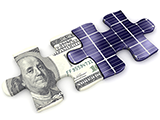Renewable Energy Certificate Monetization

A renewable energy certificate (REC) is a tradeable, market-based instrument that represents the legal property rights to the “renewable-ness”—or all non-power attributes—of renewable electricity generation. A REC can be sold separately from the actual electricity (kilowatt-hour, or kWh). The REC owner has exclusive rights to make claims about “using” or “being powered with” the renewable electricity associated with that REC. A REC is issued for every megawatt-hour (MWh) of electricity generated and delivered to the electric grid from a renewable energy resource.
If you own the RECs associated with your renewable energy project’s electricity output, you can sell these RECs to another party. In doing so, you forfeit the ability to make any claims about “using” renewable energy, but generate a new revenue stream. The revenue is a function of the system’s kWh output and the market price of RECs.
System hosts may choose to sell the RECs associated with the on-site solar PV system and in their place buy RECs sourced from other geographically eligible green power resources in order to make environmental claims. This process is referred to as REC arbitrage and allows the site host to capture the financial benefits of solar RECs while also making environmental claims and meeting the Green Power Partnership's requirements.
Below are resources to help you understand REC monetization strategies and how RECs may impact the financing and economics of your project development.
PJM Environmental Information Service (EIS) “How Do I Sell RECs?” Web Page
Short step-by-step guide on how to sell RECs generated by projects within the PJM footprint.
Describes green power procurement strategy used by electricity consumers to simultaneously decrease the cost of their renewable electricity use and substantiate renewable electricity use and carbon footprint reduction claims.
New England Power Pool Generation Information System (NEPOOL GIS) Bulletin Board
Bulletin board listing RECs for sale by NEPOOL GIS account holders.
PJM Generation Attributes Tracking System (GATS) Bulletin Board
Bulletin board listing RECs for sale by PJM GATS account holders.
